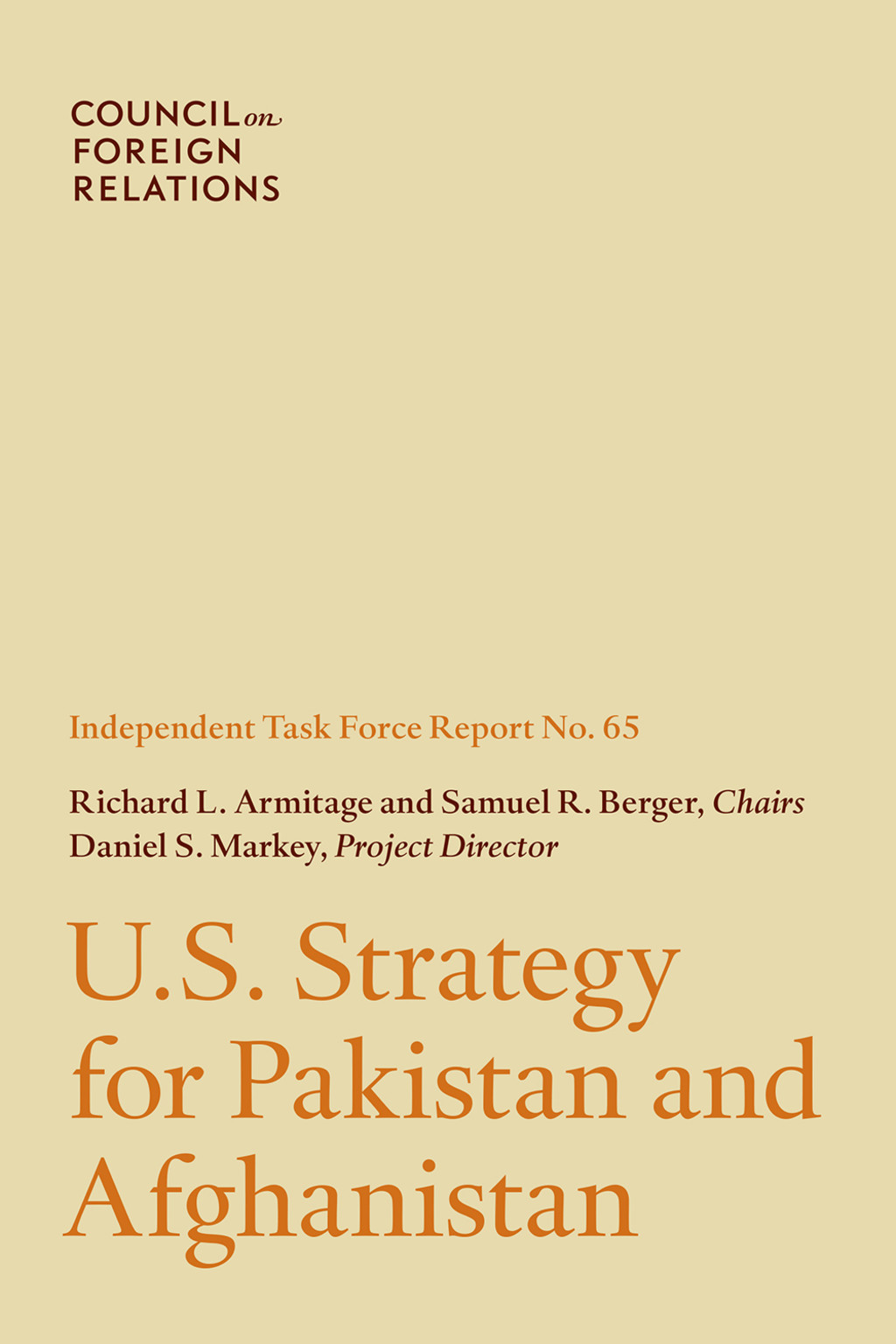Task Force Report No. #70
U.S. Strategy for Pakistan and Afghanistan
- Richard L. ArmitageCochair
- Samuel R. BergerCochair
- Daniel S. MarkeyDirector
What are Task Force Reports?
CFR sponsors Task Forces to assess issues of critical importance to U.S. foreign policy to reach bipartisan consensus on policy recommendations.
Who makes them?
Task Force members aim to reach a meaningful consensus on policy and are solely responsible for the content of their report.
Ahead of President Obama’s December review of the U.S. war effort in Afghanistan, a new Council on Foreign Relations (CFR)-sponsored Independent Task Force report on U.S. Strategy for Pakistan and Afghanistan finds that the current approach to the region is at a critical point. “We are mindful of the real threat we face. But we are also aware of the costs of the present strategy. We cannot accept these costs unless the strategy begins to show signs of progress,” says the Task Force.
While the Task Force offers a qualified endorsement of the current U.S. effort in Afghanistan, including plans to begin a conditions-based military drawdown in July 2011, the Obama administration’s upcoming December 2010 review should be “a clear-eyed assessment of whether there is sufficient overall progress to conclude that the strategy is working.” If not, the report argues that “a more significant drawdown to a narrower military mission would be warranted.”
The Task Force, chaired by former deputy secretary of state Richard L. Armitage and former national security adviser Samuel R. Berger, and directed by CFR Senior Fellow Daniel S. Markey, notes that nine years into the Afghan war, the outcome of the struggles in the region are still uncertain and the stakes are high. “What happens in Afghanistan and Pakistan matters to Americans,” affirms the report. It warns that “militants in Pakistan and Afghanistan pose a direct threat to the United States and its allies. They jeopardize the stability of Pakistan, a nuclear power that lives in an uneasy peace with its rival, India.”
The Task Force supports the U.S. investment in a long-term partnership with Pakistan, but underscores that it is only sustainable if Pakistan takes action against all terrorist organizations based on its soil. Concrete Pakistani actions against terror groups “are the bedrock requirements for U.S. partnership and assistance over the long run.” In Pakistan, “the United States aims to degrade and defeat the terrorist groups that threaten U.S. interests from its territory and to prevent turmoil that would imperil the Pakistani state and risk the security of Pakistan’s nuclear program.”
The Task Force notes that these goals are best achieved through partnership with a stable Pakistani state, but that “the challenge of fighting regional terrorist networks is compounded by the fact that Pakistan draws distinctions between such groups.” Flood-ravaged Pakistan also faces “enormous new stresses on the state—already challenged by political, economic, and security problems—increasing disaffection among its people, and weakening its ability to fight extremists in its territory.”
In Afghanistan, “the United States seeks to prevent the country from becoming a base for terrorist groups that target the United States and its allies and to diminish the potential that Afghanistan reverts to civil war, which would destabilize the region.” Afghanistan faces the challenges of “pervasive corruption that breeds the insurgency; weak governance that creates a vacuum; Taliban resilience that feeds an atmosphere of intimidation; and an erratic leader whose agenda may not be the same as that of the United States.”
The report’s recommendations include:
Pakistan
- “To further enhance Pakistan’s stability, the United States should maintain current levels of economic and technical assistance to help military and civilian leaders reconstruct and establish control over areas hard-hit by the flood, including those contested by militant forces.” The Task Force recommends “continued and expanded training, equipment, and facilities for police, paramilitaries, and the army.”
- “To reinforce U.S.-Pakistan ties and contribute to Pakistan’s economic stability in the aftermath of an overwhelming natural disaster, the Obama administration should prioritize—and the Congress should enact—an agreement that would grant preferential market access to Pakistani textiles.”
- “As it cultivates a closer partnership with Islamabad…the United States still needs to seek a shift in Pakistani strategic calculations about the use of militancy as a foreign policy tool. Washington should continue to make clear to Islamabad that at a basic level, U.S. partnership and assistance depend upon action against LeT [Lashkar-e-Taiba], the Afghan Taliban, especially the Haqqani network, and related international terror groups.”
Afghanistan
- “In Afghanistan, core American security aims can best be achieved at a lower cost if the United States manages to shift a greater burden to Afghan partners,” explains the Task Force. “The United States should encourage an initiative with three complementary elements: political reform, national reconciliation, and regional diplomacy.”
- “Political reforms should aim to grant a greater voice to a broader range of Afghan interests,” states the Task Force. “Rather than leaving the reconciliation process to [Afghan] President Karzai and his narrow support base, Washington should participate fully in guiding a broad-based, inclusive process, bearing in mind that a rapid breakthrough at the negotiating table is unlikely. Afghan reform and reconciliation should then be supported by a regional diplomatic accord brokered by the United States.”
- “To foster Afghanistan’s viability as a security partner, the United States must continue to build cost-effective Afghan security forces appropriate to the capabilities necessary to protect the population. This will require more army and police trainers, as well as an expansion of community-based stabilization forces.”
- “Afghanistan needs a self-sustaining foundation for generating jobs and revenue that will reduce dependence on international assistance. To meet this need, the United States should encourage private sector investment in Afghanistan’s considerable mineral and energy resources, its agricultural sector, and in the infrastructure needed to expand trans-Afghan trade.”
The bipartisan Task Force includes almost two dozen distinguished experts on Pakistan and Afghanistan who represent a range of perspectives and backgrounds. The report concludes: “For now, the United States should assume the lead, with the goal of encouraging and enabling its Pakistani and Afghan partners to build a more secure future. Yet even the United States cannot afford to continue down this costly path unless the potential for enduring progress remains in sight. After nine years of U.S. war in the region, time and patience are understandably short.”
Task Force Members
Richard L. Armitage is the president of Armitage International and a former deputy secretary of state (2001–2005). Prior to returning to government service in 2001, Armitage was president of Armitage Associates L.C. from 1993 until 2001. aFrom 1989 to 1993, Armitage served in various high-level diplomatic positions, including as a special emissary to Jordan’s King Hussein during the 1991 Gulf War and director of U.S. assistance to the new independent states of the former Soviet Union. Prior to this, Armitage served in the Pentagon as the assistant secretary of defense for international security affairs (1983–89) and deputy assistant secretary of defense for East Asia and Pacific affairs (1981–83). Armitage graduated in 1967 from the U.S. Naval Academy and served three combat tours in Vietnam. He is the recipient of numerous U.S. and foreign military decorations as well as awards for distinguished public service. He was awarded a KBE and became a Knight Commander of the Order of St. Michael and St. George and, as of October 13, 2010, he became an Honorary Companion of the Order of Australia.
Reza Aslan is an internationally acclaimed writer and scholar of religion and a contributing editor at the Daily Beast. He is an associate professor of creative writing at the University of California, Riverside, and a senior fellow at the Orfalea Center for Global and International Studies at the University of California, Santa Barbara. He is president and CEO of Aslan Media Inc., a frequent commentator on CNN, CBS, and NPR, and cofounder and creative director of BoomGen Studios. He is a member of the Council on Foreign Relations, the Los Angeles Institute for the Humanities, and the Pacific Council on International Policy. He also serves on the board of directors of the Ploughshares Fund, Abraham’s Vision, and PEN USA. Aslan’s first book is the international best seller No god but God: The Origins, Evolution, and Future of Islam, which has been translated into thirteen languages and was named one of the one hundred most important books of the last decade. Aslan has degrees in religions from Santa Clara University, Harvard University, and the University of California, Santa Barbara, as well as an MFA from the University of Iowa, where he was named the Truman Capote fellow in fiction.
J. Brian Atwood became dean of the Humphrey Institute of Public Affairs in October 2002. He served for six years as administrator of the U.S. Agency for International Development (USAID) during the Clinton administration. In the Clinton administration, Atwood led the transition team at the State Department and was undersecretary of state for management before being appointed head of USAID. During the Carter administration, Atwood served as assistant secretary of state for congressional relations. He was dean of professional studies and academic affairs at the Foreign Service Institute from 1981 to 1982 and the first president of the National Democratic Institute for International Affairs (1986–93). In 2001, Atwood served on UN Secretary General Kofi Annan’s panel on peace operations. He writes and speaks frequently on international development, postconflict reconstruction, foreign policy, the role of the United Nations and other multilateral organizations in international affairs, and the U.S. role in the world order. He holds a BA in government and history from Boston University and received an honorary doctorate of laws from American University. He joined the Foreign Service in 1966 and served in the U.S. embassies in Cote d’Ivoire and Spain.
David W. Barno is a senior adviser and senior fellow at the Center for a New American Security. A career Army officer, he retired as a three-star general in 200cl6 after a thirty-year career. General Barno commanded all U.S. and coalition forces in Afghanistan for nineteen months from 2003 to 2005; his military command responsibilities included Afghanistan, Pakistan, and parts of Central Asia under U.S. Central Command. His military career was highlighted by command at every level in the U.S. Army from lieutenant to lieutenant general, and extensive service in airborne, infantry, and special operations units. Commissioned as an infantry officer from the U.S. Military Academy at West Point in 1976, he also holds an MA in national security studies from Georgetown University and is a graduate of the U.S. Army Command and General Staff College and the U.S. Army War College. Following his retirement from active service, he served for four years as the director of the Near East South Asia Center for Strategic Studies at the National Defense University. From 2007 to 2009, he served as chairman of the Secretary of Veterans Affairs Advisory Committee on Operation Iraqi Freedom and Enduring Freedom Veterans, Families and Survivors.
Samuel R. Berger is chair of Albright Stonebridge Group, a global strategy firm. Berger works across many of the firm’s engagements, with a strong focus on Asia, Russia and Central Asia, and the Middle East. He is also a principal of Albright Capital Management LLC. Berger served as national security adviser to President Bill Clinton from 1997 until 2001, as deputy national security adviser during Clinton’s first term, as senior foreign policy adviser to Governor Clinton during his 1992 presidential campaign, and as director of national security for the 1992 Clinton-Gore transition. Prior to his service in the Clinton administration, Berger served as special assistant to former New York City mayor John Lindsay and as legislative assistant to former U.S. senator Harold Hughes (D-IA) and former congressman Joseph Resnick (D-NY). Berger also served as deputy director of the State Department’s Policy Planning Staff from 1977 to 1980. Currently, Berger is co-chairing a project on the Middle East peace process with the United States Institute of Peace. He is an active participant in the Aspen Institute’s U.S.-India Strategic Dialogue and serves on the international advisory council of the Brookings Doha Center. Berger received his BA from Cornell University and his JD from Harvard Law School.
Karan K. Bhatia joined General Electric Co. in 2007 as vice president and senior counsel for international law and policy. At GE, he oversees the company’s engagement on public policy issues with governments around the world and works to expand its presence in global markets. In November 2005, Ambassador Bhatia was confirmed by the Senate to serve as deputy U.S. trade representative (USTR), overseeing U.S. trade policy with Asia and Africa. Before joining USTR, he served as assistant secretary for aviation and international affairs at the U.S. Department of Transportation, where he crafted U.S. international and domestic aviation policy and supervised the negotiation of international air services agreements with more than twenty countries. Prior to that, he served in the Department of Commerce, where he was deputy undersecretary and chief counsel for the Bureau of Industry and Security, the U.S. government agency that administers U.S. export controls. Before joining the Bush administration in 2001, he was an equity partner at the Wilmer, Cutler, and Pickering law firm, where he was a member of the firm’s international and corporate groups. He holds a BA from Princeton University, an MA from the London School of Economics, and a JD from Columbia University.
Marshall M. Bouton became president of the Chicago Council on Global Affairs in August 2001. Before that, he served for twenty years at the Asia Society in New York, most recently as executive vice president and chief operating officer. Previous positions include director for policy analysis in the Office of the Deputy Assistant Secretary of Defense for Near East, Africa, and South Asia; special assistant to the U. S. ambassador to India; executive secretary for the Indo-U.S. Subcommission on Education and Culture; and program director for India affairs at the Asia Society. Bouton earned a BA in history at Harvard, an MA in South Asian studies from the University of Pennsylvania, and a PhD in political science at the University of Chicago in 1980.
Steve Coll is president of the New America Foundation and a staff writer at the New Yorker. Previously, he spent twenty years as a foreign correspondent and senior editor at the Washington Post, serving as managing editor from 1998 to 2004. Coll’s professional awards include two Pulitzer Prizes. He won the first of these, for explanatory journalism, in 1990, for his series with David A. Vise about the SEC. His second was awarded in 2005, for his book Ghost Wars, which also won the Council on Foreign Relations‘ Arthur Ross Book Award, the Overseas Press Club Award, and the Lionel Gelber Prize for best book published on international affairs during 2004. Other awards include the 1992 Livingston Award for outstanding foreign reporting, the 2000 Robert F. Kennedy Memorial Award for his coverage of the civil war in Sierra Leone, and a second Overseas Press Club Award for international magazine writing. Coll graduated from Occidental College in 1980 with a BA in English and history.
Joseph J. Collins joined the National War College faculty in 2004 as professor of national security strategy. Before this assignment, Collins served for three years as deputy assistant secretary of defense for stability operations, the Pentagon’s senior civilian official for peacekeeping, humanitarian assistance, and stabilization-reconstruction operations in Afghanistan. From 1998 to 2001, he was a senior fellow at the Center for Strategic and International Studies, where he wrote major studies on economic sanctions, military culture, and national security policy. A retired Army colonel, his twenty-eight years of military service were divided equally between infantry and armor assignments in the United States, South Korea, and Germany; a decade teaching at West Point in the Department of Social Sciences; and a decade-long series of policy assignments on the Army and Joint Staffs, and in the Office of the Secretary of Defense. He has been a life member of the Council on Foreign Relations since 1992 and received a doctorate in political science from Columbia University.
James F. Dobbins has held a number of State Department and White House posts, including assistant secretary of state for Europe, special assistant to the president, special adviser to the president and secretary of state for the Balkans, and ambassador to the European community. Dobbins had numerous crisis management and diplomatic troubleshooting assignments as the Clinton administration’s and, more recently, the Bush administration’s special envoy for Afghanistan, Kosovo, Bosnia, Haiti, and Somalia. Past diplomatic assignments include the withdrawal of American forces from Somalia, the American-led multilateral intervention in Haiti, the stabilization and reconstruction of Bosnia, and the NATO intervention in Kosovo. In the wake of September 11, 2001, he was named the Bush administration’s representative to the Afghan opposition with the task of putting together and installing a broadly based successor to the Taliban regime. He represented the United States at the Bonn Conference that established the new Afghan government, and, on December 16, 2001, raised the flag over the newly reopened U.S. embassy.
C. Christine Fair is an assistant professor in the Center for Peace and Security Studies at Georgetown University’s Edmund A. Walsh School of Foreign Service. She is also a senior fellow with the Counterterrorism Center at West Point and a research fellow with the National Bureau of Asia Research’s National Asia Research Program. Prior to joining Georgetown, she served as a senior political scientist with the RAND Corporation, a political officer to the United Nations Assistance Mission to Afghanistan in Kabul, and a senior research associate with the United States Institute of Peace. Her research focuses on political and military affairs in South Asia. She has authored, coauthored and coedited several books and has written numerous peer-reviewed articles covering a range of security issues in Afghanistan, Bangladesh, India, Pakistan, and Sri Lanka. She is a member of the International Institute of Strategic Studies and the Council on Foreign Relations, serves on the editorial board of Studies in Conflict and Terrorism and the Journal of Strategic Studies, and is an associate editor of India Review. Fair has an MA from the Harris School of Public Policy and a PhD from the Department of South Asian Languages and Civilization, both at the University of Chicago.
John A. Gastright is the vice president for government affairs at Dyn-Corp International. In 2005, he joined the Bureau of South Asian Affairs as a deputy assistant secretary, where he focused primarily on Pakistan, Bangladesh, and Afghanistan. Before this appointment, Gastright was the director of House Affairs, Bureau of Legislative Affairs at the Department of State. His State Department service also included a brief term as the acting coordinator for Afghanistan in 2004. He first joined the Department of State as the special assistant to the deputy secretary of state, Richard L. Armitage, and from 2003 to 2004 he served as the staff specialist for South Asia. Before his service with the Department of State, he served on Capitol Hill as chief of staff to Representative Jack Kingston (R-GA) and as projects director and military assistant to Senator Strom Thurmond (R-SC). He previously served as a naval officer from 1988 to 1994 and as a police officer from 1987 to 1988 with the City of Charleston, South Carolina. Gastright received a BA in political science from the Citadel, an MA in national security studies from the U.S. Naval War College, and an MA in congressional studies from the Catholic University of America.
Robert L. Grenier is chairman of ERG Partners, which provides strategic and financial consulting services for firms in the security industry. He is a highly decorated twenty-seven-year veteran of the Central Intelligence Agency’s (CIA) Clandestine Service. A specialist in the Near East and South Asia with fifteen years‘ experience in foreign postings, Grenier has most recently served as director of the CIA’s Counterterrorism Center (2004–2006), as the CIA’s Iraq mission manager (2002–2004), and as the CIA’s chief of station in Islamabad, Pakistan (1999–2002). Earlier in his career, he was deputy national intelligence officer for the Near East and South Asia and a special assistant to the undersecretary of state. He conceived and organized the CIA’s Counter-Proliferation Division, serving as its first chief of operations. He was also chief of the CIA’s basic training facility, and authored the Clandestine Service’s code of ethics. Grenier received an AB in philosophy from Dartmouth College and later did graduate studies at the University of Virginia. He has appeared widely in both broadcast and print media and writes frequently on intelligence and foreign policy topics.
John M. Keane is a senior partner at SCP Partners. A four-star general, he completed thirty-seven years of public service in 2003, culminating as acting chief of staff and vice chief of staff of the U.S. Army. General Keane is a career paratrooper, a combat veteran of Vietnam decorated for valor, who spent much of his military life in operational commands where his units were employed in Somalia, Haiti, Bosnia, and Kosovo. He commanded the 101st Airborne Division (Air Assault) and the 18th Airborne Corps, the Army’s largest war fighting organization. He was in the Pentagon on 9/11 and provided oversight and support for the wars in Afghanistan and Iraq. He is a member of the secretary of defense’s policy board and played a major role in recommending the “surge strategy” in Iraq. General Keane graduated with a BS in accounting from Fordham University and with an MA in philosophy from Western Kentucky University. He is a graduate of the Army War College and the Command and General Staff College.
Michael Krepon is cofounder of the Henry L. Stimson Center and teaches in the politics department at the University of Virginia. He is the author or editor of thirteen books and more than 350 articles. He divides his time between Stimson’s South Asia and space security projects. The South Asia project concentrates on escalation control, nuclear risk reduction, confidence-building, and peacemaking between India and Pakistan. This project entails field work, publications, and Washington-based programming, including a visiting fellowship program. The space security project seeks to promote a code of conduct for responsible space-faring nations and works toward stronger international norms for the peaceful uses of outer space. Before cofounding the Stimson Center, he worked at the Carnegie Endowment for International Peace, the U.S. Arms Control and Disarmament Agency during the Carter administration, and in the U.S. House of Representatives, assisting Congressman Norm Dicks (D-WA). He received a BA from Franklin & Marshall College and an MA from the School of Advanced International Studies, Johns Hopkins University. He also studied Arabic at the American University in Cairo, Egypt.
Sloan C. Mann is the cofounder and managing director of Development Transformations (DT), a small veteran-owned company that focuses on improving the capability, capacity, and effectiveness of civilian and military personnel involved in conflict and postconflict environments. Before founding DT, he held a diverse array of jobs in the military, private, and public sectors. From 2007 to 2009, he was U.S. Agency for International Development (USAID) development adviser to the U.S. Special Forces in Afghanistan. Mann worked for a number of different offices at USAID, including the Office of Foreign Disaster Assistance (OFDA) and the Office of Transition Initiatives (OTI). He was a field program officer with OFDA responsible for all operations in southern and western Darfur, Sudan. In Iraq as a member of the Disaster Assistance Response Team and OTI, he worked one year as an abuse prevention officer focusing on identifying, monitoring, and preventing human rights violations. While in the military, Mann served as a U.S. Army infantry officer from 1997 to 2002 and was a member of peacekeeping deployments to Bosnia-Herzegovina and Kosovo. Mann received a BS in international politics from West Point and an MA from the School of Foreign Service at Georgetown University.
Daniel S. Markey is senior fellow for India, Pakistan and South Asia at the Council on Foreign Relations, where he specializes in security and governance issues in South Asia. From 2003 to 2007, Markey held the South Asia portfolio on the secretary’s policy planning staff at the U.S. Department of State. Prior to government service, he taught in the Department of Politics at Princeton University, served as executive director of Princeton’s Research Program in International Security, and was a postdoctoral fellow at Harvard’s Olin Institute for Strategic Studies. He received a BA in international studies from Johns Hopkins University and a PhD from Princeton’s Department of Politics.
John A. Nagl is the president of the Center for a New American Security. He is a visiting professor in the War Studies Department at King’s College London and a member of the Defense Policy Board, the Council on Foreign Relations, Veterans of Foreign Wars, and the International Institute of Strategic Studies. He served as an armor officer in the U.S. Army for twenty years, retiring with the rank of lieutenant colonel. He taught national security studies at West Point’s Department of Social Sciences and in Georgetown University’s security studies program. He served as a military assistant to two deputy secretaries of defense and later worked as a senior fellow at the Center for a New American Security. He was awarded the Combat Action Badge by General James Mattis of the U.S. Marine Corps, under whose leadership he fought in Al Anbar in 2004. Nagl was a distinguished graduate of the U.S. Military Academy and earned an MA in military arts and sciences from the Command and General Staff College, where he received the George C. Marshall Award as the top graduate. He earned his PhD from Oxford University as a Rhodes scholar.
John D. Negroponte joined McLarty Associates as vice chairman in 2009 following a distinguished career in diplomacy and national security. Ambassador Negroponte held government positions abroad and in Washington between 1960 and 1997 and again from 2001 to 2008. He has been ambassador to Honduras, Mexico, the Philippines, the United Nations, and Iraq. In Washington he served twice on the National Security Council staff, first as director for Vietnam in the Nixon administration and then as deputy national security adviser under President Ronald Reagan. He has also held a cabinet-level position as the first director of national intelligence under President George W. Bush. His most recent position in government was as deputy secretary of state, where he served as chief operating officer. While in the private sector, he was executive vice president of the McGraw-Hill Companies and chairman of the French-American Foundation. He recently became a distinguished senior research fellow in grand strategy and a lecturer in international affairs at Yale University. He also serves as chairman of the Council of the Americas/Americas Society and as a trustee of the Asia Society. He has received numerous awards, including the State Department’s Distinguished Service Medal on two separate occasions. In 2009 President Bush awarded Ambassador Negroponte the National Security Medal.
Charles S. Robb joined the faculty of George Mason University as a distinguished professor of law and public policy in 2001. Previously, he served as lieutenant governor of Virginia, as Virginia’s sixty-fourth governor (1982–86), and as a U.S. senator (1989–2001). While in the Senate, he became the only member to serve simultaneously on all three national security committees (Intelligence, Armed Services, and Foreign Relations). He also served on the Finance, Commerce, and Budget committees. During the 1960s, he served on active duty with the U.S. Marine Corps, retiring from the Marine Corps Reserve in 1991. He received his JD from the University of Virginia in 1973, clerked for Judge John D. Butzner Jr. on the U.S. Court of Appeals for the Fourth Circuit, and practiced law with Williams and Connolly before being elected to state office. He was a partner at Hunton and Williams and a fellow at Harvard University’s Institute of Politics and William & Mary’s Marshall Wythe School of Law. Since leaving the Senate in 2001, he has served as chairman of numerous organizations, including the Board of Visitors at the U.S. Naval Academy and the President’s Commission on Intelligence Capabilities of the United States Regarding Weapons of Mass Destruction.
Teresita C. Schaffer is director of the South Asia Program at the Center for Strategic and International Studies. Her areas of expertise include U.S.-South Asia relations, regional security, and economics, energy, and health policy in India. During her thirty-year career in the U.S. Foreign Service, she specialized in international economics and South Asia, on which she was one of the State Department’s principal experts. From 1989 to 1992, she served as deputy assistant secretary of state for South Asia, at that time the senior South Asia position in the department. From 1992 to 1995, she served as U.S. ambassador to Sri Lanka, and from 1995 to 1997, as director of the Foreign Service Institute. Her earlier posts included Tel Aviv, Islamabad, New Delhi, and Dhaka, as well as a tour as director of the Office of International Trade in the State Department. After retiring from the Foreign Service, Schaffer spent a year as a consultant on business issues relating to South Asia. She has also taught at Georgetown University and American University. Schaffer speaks French, Swedish, German, Italian, Hebrew, Hindi, and Urdu and has studied Bangla and Sinhala.
Shirin R. Tahir-Kheli is currently a scholar at the Carnegie Corporation of New York and is working on a monograph, “Diplomacy Without Negotiation: America’s Outreach to the Muslim World 2003–2006.” Recently, Ambassador Tahir-Kheli was Secretary of State Condoleezza Rice’s senior adviser for women’s empowerment. Before this, she served as the secretary’s senior adviser on United Nations reform. From 2003 to 2005, she was the special assistant to the president and senior director for democracy, human rights, and international operations at the National Security Council. From 1993 to 1995, she was a senior fellow at the Center of International Studies at Princeton University. From 1984 to 1990, she served as director for South Asian Affairs on the National Security Council. From 1982 to 1984, she was a member of the policy planning staff at the Department of State. The author of numerous books and articles on U.S.-Pakistan relations, Ambassador Tahir-Kheli has been a member of the Council on Foreign Relations since 1990. She has a BA from Ohio Wesleyan University and an MA and a PhD in international relations from the University of Pennsylvania.
Ashley J. Tellis is a senior associate at the Carnegie Endowment for International Peace specializing in international security, defense, and Asian strategic issues. While on assignment to the U.S. Department of State as senior adviser to the undersecretary of state for political affairs, he was intimately involved in negotiating the civil nuclear agreement with India. Previously, Tellis was commissioned into the Foreign Service and served as senior adviser to the ambassador at the U.S. embassy in New Delhi. He also served on the National Security Council staff as special assistant to the president and senior director for Strategic Planning and Southwest Asia. Before his government service, he was senior policy analyst at the RAND Corporation and professor of policy analysis at the RAND graduate school. He is the research director of the Strategic Asia program at the National Bureau of Asian Research. He is also a member of the Council on Foreign Relations, the International Institute of Strategic Studies, the U.S. Naval Institute, and the Navy League of the United States. Tellis received a BA and an MA from the University of Bombay and an MA and a PhD from the University of Chicago.
John W. Warner is a senior adviser at Hogan Lovells. He rejoined the firm after deciding not to seek a sixth term as U.S. senator for the Commonwealth of Virginia. During his thirty years in the Senate, he served on the Senate Armed Services Committee. He also served on the Senate Health, Education, and Pensions Committee; Committee on Homeland Security and Governmental Affairs; Select Committee on Intelligence; Commerce Committee; Environment and Public Works Committee; and Rules Committee. Senator Warner volunteered for two periods of active military duty, the first as an enlisted sailor in the final years of World War II and the second as a lieutenant in the U.S. Marines during the Korean War. Between 1953 and 1960, he clerked for the Honorable E. Barrett Prettyman, U.S. Court of Appeals for the District of Columbia Circuit, and was an assistant U.S. attorney for the District of Columbia. He joined Hogan & Hartson as an associate in 1961 and became a partner in 1964. In 1969, he was appointed and confirmed by the Senate as undersecretary, and later as secretary, of the U.S. Navy. Senator Warner received a BS from Washington and Lee University and an LLB from the University of Virginia School of Law.
Andrew Wilder is the director of Afghanistan and Pakistan programs at the United States Institute of Peace (USIP). Prior to joining USIP, he was a research director at Tufts University’s Feinstein International Center. Previously, he worked in Afghanistan, where he established and was the director of Afghanistan’s first independent policy research institution, the Afghanistan Research and Evaluation Unit. Between 1986 and 2001, he worked for several international NGOs managing humanitarian and development programs in Pakistan and Afghanistan. He served as the director of the Pakistan/Afghanistan program of Save the Children (U.S.) for six years. He is the author of The Pakistani Voter and a coauthor of A Guide to Government in Afghanistan. His recent research and publications have looked at the effectiveness of aid in promoting stabilization objectives in Afghanistan, police reform policies in Afghanistan, Afghan refugee education policy in Pakistan, the politics of civil service reform in Pakistan, electoral politics and policies in Pakistan and Afghanistan, and the politics of subnational administration in Afghanistan. Wilder has a BSFS degree from Georgetown University and an MALD and a PhD from the Fletcher School of Law and Diplomacy at Tufts University.






